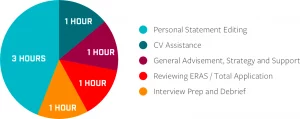Quiz: Should You Consider Residency Counseling?
- by
- Jan 27, 2023
- Reviewed by: Amy Rontal, MD

As you prepare the necessary materials to apply for residency programs, you may find yourself feeling a bit overwhelmed. After all, this is a critical juncture in your professional journey and there are many moving parts to consider. From collecting ERAS letters of recommendation to training yourself for residency interviews, this can be a complicated time.
But it’s important to remember that you’re not alone—not only do you have peers and mentors waiting in the wings, but you can also reach out to residency consultants. These are residency application experts who might just be the ideal resource to shepherd you through this process! Read on to find out if residency counseling is the right fit for you.
The Importance (and Challenges) of Residency Applications
Applying to a residency program in your chosen field is a pivotal milestone in your medical career. The process is complex, maybe even more so than your medical school application process was. The two share many factors in common, such as writing a compelling personal statement, acing your medical education curriculum, interviewing well, and obtaining necessary letters of recommendation. All of this happens during a commonly busy season and takes up the majority of your fourth year, which can coincidentally involve higher-level rotations such as away rotations or sub-internships.
Many medical students make it through this process with the help of their mentors and classmates, but it’s common for medical students to need a little extra help when it comes to improving their application. After all, you want to have the best shot at matching into a great residency with superb training and opportunity. Many medical students seek guidance, often from their school’s curriculum office.
More specialized residency counseling services may benefit some students who want an extra leg up on the competition. Many students also have extenuating circumstances that might make them an ideal candidate for some additional, professional residency counseling.
What is Residency Counseling?
With competition for medical residency higher than it has ever been, residency consultants provide insider advice and guidance for all parts of the residency application process to help maximize your chances of matching with your dream residency program.
Typical residency consulting work consists of:
Source: Blueprint Test Prep Residency Application & ERAS Consulting
Whether you’re looking for a one-time targeted planning session, or you’d like to comprehensively review your residency application and prepare for interviews, residency consultants can tailor their services to precisely what you need. Many consultants also specialize in certain aspects of the residency application process, including working with IMGs and FMGs.
Not sure if you’d benefit from residency application counseling? Take the quiz below to find out!
Quiz: 6 Signs Residency Counseling Can Benefit You
1. Do you want your personal statement or CV reviewed by an experienced set of eyes?
Over my career, I have reviewed hundreds of applications including CVs and personal statements. Some are stellar, some not so much. Math doesn’t lie and the truth is that the majority of applications are just average.
Average is fine—you simply want to ensure that your application is well-rounded, not packed with any huge issues, and not lacking any key ingredients that programs look for. You want your personal statement free from grammar errors or touchy subjects. Whether or not you choose professional services, have at least a few people read through your application.
That being said, if you’re eager for someone to thoroughly beautify your personal statement, you might be toeing into professional counseling territory. Your peers are perfectly capable of checking things over, but where consultants provide that extra umph are deeper edits based on their knowledge of what residency programs like to hear from applicants.
2. Do you have red flags on your application?
To broadly define what a red flag is when it comes to residency applications: a red flag is any aspect of your application that may bring challenges or additional consideration when viewed by program directors and residency selection committees. Some examples of common red flags include interruptions in medical school education, low USMLE scores, or professionalism/behavioral errors that have made it onto your record.
A red flag can present an intimidating obstacle that you may feel overwhelmed or embarrassed by. Simultaneously, a red flag can present a situation where you’ve improved or made crucial changes in response to hardship and ultimately emerged as a better person and future physician. It’s all about how you frame it. A residency counselor can help address red flags on your application and coach you on how to best present the situation to a residency selection committee.
3. Would you like help with interview preparation and actionable feedback?
Interviews are especially important in the residency selection process because oftentimes, residency classes are small. Leadership in a residency program wants to assure that the applicants they are interviewing are the right “fit” for a program and will be able to work well with other residents, existing resident classes, and faculty. Coming across well in interviews as personable and diligent will only serve to strengthen your application.
On the other hand, coming across poorly can damage your chances of matching with your desired program, even though every other aspect of your application might be strong. Like many other things in life, practice is the key to perfection. A residency counselor can review common interview questions with you, coach you on your approach to answering interview questions, and provide feedback on your syntax and body language until you lock down this important skill. Furthermore, we offer much-needed virtual interview etiquette.
4. Are you having trouble figuring out where to start?
With so many moving pieces at play, correct timing and time management are key to the residency application. For example, you may have to schedule your away rotations during months when you can get a recommendation letter in time to submit with your application. You have to request and pay for your formal USMLE transcripts, and craft a strong CV in addition to writing a compelling personal statement.
Sometimes, your letter writers require you to submit your personal statement to them before they’ll agree to write you a letter! If you’re running into issues with any one aspect of your application, this can end up limiting your overall progress and setting you back.
A residency counselor can help you organize your to-do list in an approachable, sequential manner, and help you tackle the tasks that give you the most trouble. They can also help advise you on tips and tricks on how to best approach the application process, such as arranging backup letter writers, finding conferences where you may be able to present your research, and helping you edit your personal statement.
5. Are you applying to a competitive specialty?
The stress of the residency application process can be magnified tenfold if you’re applying to a competitive specialty where you’re not “guaranteed” to match. To be fair, nobody is guaranteed to match to any type of residency, but common wisdom tells us that some specialties are much more competitive than others.
You know how important it is to have the fundamentals that will give you a chance at matching a competitive specialty in the first place—that is, a strong track record demonstrating good grades, sustained interest in the specialty, and solid extracurriculars. However, you still need more to stand out among the crowd. With competitive specialties, it’s even more important to get your foot in the door with an impressive paper application and secure a position with a memorable and favorable interview.
A residency counselor, preferably in the same field or similar to the one you’re applying to, can save you time, stress, and money, by helping you be the best applicant you can be, and put the best foot forward.
6. Do you lack strong mentors who have been in the same situation/same specialty?
While many of the above obstacles can be partially solved with a strong mentor, not every medical student will have similar access to these mentors —especially one who is in the field you’re hoping to enter.
Maybe you are entering a specialty that is small or extremely demanding, and the physicians you’ve encountered through research or extracurriculars genuinely do not have the bandwidth to take on a mentee. Alternatively, you feel limited in your ability to confide in the mentors you do have. There may be no recent graduates from your medical school who entered your same field, or again you may not feel comfortable sharing your personal challenges and details with them.
Resident counselors can help fill this gap by providing the expertise that is needed to succeed in applying to your specialty. They fill the role of a mentor who walks you through many of the bumps along the road, such as weaknesses in your application, or how to improve your interview skills.
Quiz Results
If you answered yes to more than a few of these questions, you are highly likely to benefit from residency counseling in order to strengthen your application for residency, look more attractive to programs, and be well-prepared to tackle interview season. Having someone walk you through the process and oversee its complexities can definitely give you a much-needed boost as a competitive applicant!
Interested in working with a residency counselor? You can schedule a free phone consultation now to chat with one of our senior advisors and get matched with a consultant tailored to your needs!
About the Author
Mike is a driven tutor and supportive advisor. He received his MD from Baylor College of Medicine and then stayed for residency. He has recently taken a faculty position at Baylor because of his love for teaching. Mike’s philosophy is to elevate his students to their full potential with excellent exam scores, and successful interviews at top-tier programs. He holds the belief that you learn best from those close to you in training. Dr. Ren is passionate about his role as a mentor and has taught for much of his life – as an SAT tutor in high school, then as an MCAT instructor for the Princeton Review. At Baylor, he has held review courses for the FM shelf and board exams as Chief Resident. For years, Dr. Ren has worked closely with the office of student affairs and has experience as an admissions advisor. He has mentored numerous students entering medical and residency and keeps in touch with many of them today as they embark on their road to aspiring physicians. His supportiveness and approachability put his students at ease and provide a safe learning environment where questions and conversation flow. For exam prep, Mike will help you develop critical reasoning skills and as an advisor he will hone your interview skills with insider knowledge to commonly asked admissions questions.











